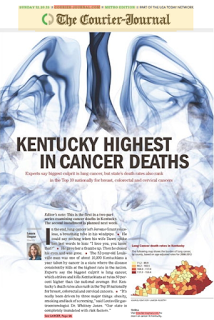Kentucky ranks first in deaths from cancer, a longtime fact given big play on the Sunday front page of The Courier-Journal

Kentucky has led the nation in cancer deaths for several years, but that fact hasn’t been trumpeted on the front page of a major newspaper in quite the way The Courier-Journal did Sunday, publishing a long story by Laura Ungar that explains the problem in the state and ways to address it.
“The biggest culprit is lung cancer, which strikes and kills
Kentuckians at rates 50 percent higher than the national average,” Ungar writes, noting the state’s high smoking rate. “But
Kentucky’s death rates also rank in the Top 10 nationally for breast,
colorectal and cervical cancers.”
“It’s really been driven by three
major things: obesity, smoking and lack of screening,” Louisville
gastroenterologist Dr. Whitney Jones told Ungar. “Our state is completely inundated
with risk factors.”
 |
| How most states rank in cancer deaths (C-J chart) |
Other causes include poverty and limited education among many Kentuckians. That makes them less likely to be screened for cancer, and more likely to die from it because it is discovered too late. “Federal figures analyzed by the American Cancer Society
show 46.8 percent of Kentucky women 40 and older got a mammogram and
clinical breast exam in the past year, compared with around 60 percent
in states with the best rates,” Ungar writes.
Efforts to increase screening have had the most success against colon cancer. Since the Colon Cancer Prevention Project started 11 years ago, “The screening rate has more than doubled to 69.6 percent, and colorectal cancer deaths are down more than 25 percent statewide,” Ungar notes.
A screen for lung cancer has been developed only recently, “and today’s preventive low-dose CT scans for longtime smokers are far
less routine than tests like mammograms or colonoscopies and are not
always covered by private insurance,” Ungar reports.
While smoking is generally blamed for lung cancer, the disease can also be caused by environmental factors, and “up to 20 percent of those who succumb to lung cancer are non-smokers,” Ungar notes. “The risk of lung cancer is much higher for smokers exposed to carcinogens such as radon, asbestos, arsenic or chromium. The
U.S. Environmental Protection Agency classifies a wide swath of Central
Kentucky as having the highest potential for indoor radon gas, the
second-leading cause of lung cancer.” Research has shown high rates of arsenic and chromium in Appalachia.
“Shortages of doctors and cancer screening and treatment facilities
make things even worse,” Ungar reports. “A workforce capacity study conducted for the
state by Deloitte Consulting in 2013 found that Kentucky needed 3,790
more doctors just to meet pre-ACA demand and would need many more by
2017. Complicating matters, rural Kentuckians often live long
distances from specialists and cancer centers, and may face
transportation problems as well. . . . The
longer the drive to medical facilities, the later cancer is diagnosed.”
